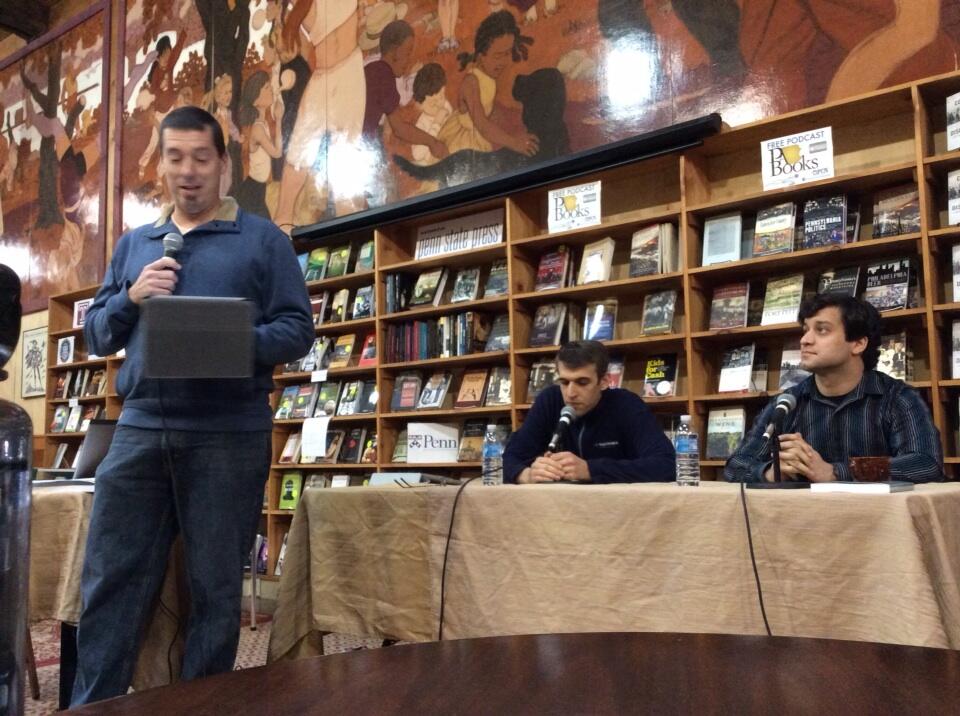This past weekend, I was at the Midtown Scholar in Harrisburg, Pennsylvania for my first ever in-person debate, part of the “Think! Of God and Government” debate series I’m having with Christian author Andrew Murtagh.
The Midtown Scholar is a huge, gorgeous independent bookstore – I’m told it used to be a movie theater – with a cafe and reading area surrounded by tall bookshelves and murals, and a second-floor viewing gallery that overlooks the rest of the space. I got there just a short time before our debate was scheduled to begin, but if not for that, it’s the kind of place where I could easily have spent all day just browsing.
I met Andrew at the bookstore, as well as our moderator, Alan Rathbun. He was a pastor from a local church who was recruited by Andrew, but I have to say he was scrupulously fair.
When the time came, we started out with a friendly game of ping-pong to see who’d get to speak first (Andrew won, three points to two). Each of us gave a short opening statement (mine was drawn mostly from my statement of principles), then we got straight to the questions: some agreed on in advance, others submitted by the audience during the debate. For each question, one person got to give their answer, then the other delivered a short rebuttal. We were talking for about two hours, but I only know that because I checked my watch afterward. I was having so much fun, I hardly noticed the passage of time!
We debated the nature of truth, and what it means to be moral; theological doctrines like the historicity of Jesus, the problem of evil and the cosmological argument; and political ideas like the permissibility of abortion, the wisdom of inserting “Under God” in the Pledge of Allegiance, what America’s founding fathers would think if they saw the country today, and whether Obamacare is a good solution to the nation’s health-care crisis.
On the abortion question, I got to talk about Savita Halappanavar and the more recent Tamesha Means case, using them as examples of what inevitably happens when women are denied the right to bodily autonomy. I said that the founding fathers, though they’d likely be shocked by all the social changes that have happened in America (like the extension of the franchise to women and black people), would probably also recognize the kind of rational, experimental spirit that they deliberately built into the Constitution. I added that some of our enduring political conflicts, like the north/south divide, would almost certainly be drearily familiar to them.
On the historicity question, I expressed my view that Jesus was probably a mythical figure, which I think most people in the audience found to be a startling idea (one gentleman asked several follow-up questions) – which was fine by me; I’m especially happy to bring ideas like that to people who aren’t already familiar with them, and it gave me an opportunity to talk about the multitudes of incompatible early gospels and how the church picked and chose among them for either mystical or political reasons. I also got to point out that “Under God” was only added to the Pledge in the McCarthy era, something Andrew later said he hadn’t known.
We got a good turnout, in spite of a dire weather forecast that proved unfortunately accurate. By the time our debate was over, a major blizzard had slammed Harrisburg, and the roads were choked with snow. The highways were impassable, and I ended up spending the night in town instead of driving back to New York like I’d planned. But it turned out to be a pleasant evening: Andrew and his wife had me over at their house for a few hours, then found a hotel for me nearby. Whatever our theological differences, I’m grateful for the wonderful hospitality they showed me. I’m planning on hosting Andrew in New York sometime in the spring for a Round Two, so here’s hoping I’ll have a chance to return it!
